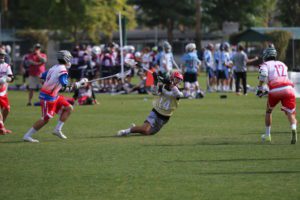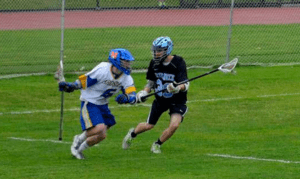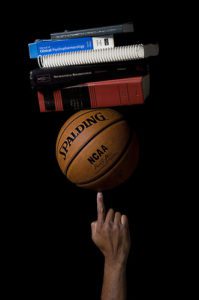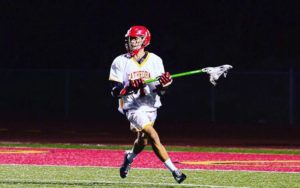I received a Division I Lacrosse scholarship by accident…said no one ever.
Posted by SportsForce in College, High School, Lacrosse, Prep, Recruiting, Tips & Advice, tags: College Coaches, college lacrosse, college lacrosse recruiters., college recruiting, college recruiting effort, college recruiting game plan, hard work, high school lacrosse, lacrosse practice, natural talent, recruiting success, student athletes

Raw talent and athleticism can dominate a 7/8th-grade lacrosse game, and we’ve all seen that in action. When you get to higher levels, however, the players that are putting in the work to improve their game quickly catch and surpass these “naturally good” players who don’t put as much work in to get better. Players who are building their strength and endurance in the offseason, who never let their stick go untouched in any given week, who show up to practice to train hard, and who take care of their health and nutrition habitually eventually rise to the top.
Hard work beats talent when talent doesn’t work hard
We’ve all heard the stories about Michael Jordan being cut from his high school basketball program as a freshman, Steph Curry getting very little interest from college coaches, and Tom Brady being drafted in the NFL’s sixth round, 199th overall. If they simply accepted these circumstances and believed they just “didn’t have it”, where might they be today? Certainly not among the greatest performers their sports have ever seen.
So here are some things that highly successful athletes do to stay ahead:
1. While the world sleeps, they work
How many times do you catch yourself saying “I just ran out of time today,” making an excuse for why you didn’t go to the gym, or go for a run, or hit the wall for some stick work? I know I have. Well here is your solution… get up early, perhaps 5:00/6:00 am, and get it done first. I promise you all Fortune 500 CEO’s and Olympic athletes don’t sleep in or watch 4+ hours of TV a day, or waste hours on social media.
Think about it, do you want to be someone who reads about other people’s greatness or do you want to be someone that others read about your greatness? You decide. I think you will find that the morning calm before the world wakes up is a magical and spiritual time, and there is no greater feeling in the world than heading off to school, or your work day, knowing that you have already achieved something great… a long run, gym, or yoga class.
2. Their work creates confidence, so when life presents an opportunity, they seize it without hesitation
Opportunity is defined as “a set of circumstances that makes it possible to do something.” I am sure you all are recognizing the big opportunities– invitation to a recruiting camp, showcase, etc. But let’s really break it down and focus on the little opportunities that you may be overlooking that have the greatest impact. The opportunity to hit the gym with your parents or friends, the opportunity to play in a box league, the opportunity to reach out to a local collegiate player to train with them, the opportunity to stay late after practice and help a teammate or yourself work on your dodges, or stick handling, or shooting.
It is these little opportunities that will raise your game immensely. Gen. Colin Powell, former Secretary of State said “If you are going to achieve excellence in big things, you develop the habit in little matters. Excellence is not an exception, it is a prevailing attitude.” What he means by this is that if you are going to succeed on the grander scale you need to first succeed on a smaller scale. Start your day with making your bed. It is a little achievement but it is nonetheless an achievement and a start.
3. They create routines and hold themselves accountable
We all know routine is important, but we can all get a calendar and map out our week and think, wow, I am going to get so much done this week. But what I want you to do is get to the END of your week and say, “Wow, I GOT so much done this week!”
Look back and see how many actions you were able to cross off. This is accountability, and I promise you there is no one in your life that is going to force you to do anything. Your parents are great advocates of yours, along with your friends and teammates, but at the end of the day, the only person that can make you get up and run farther, or faster, or do a third set of squats IS YOU. This is a true testament to how bad do you want to be great? I guarantee all those lacrosse players you are watching on TV seldom had to be told to run harder, run farther, or lift more. They do it because they want to be great!
4. They fill their bodies with proper nutrients and a lot of it
Fuel. Cars need it to run, engines machines need it to run, and we ABSOLUTELY need it to run. But you have to remember that it needs to be the right fuel. If you just went to the gym and worked out hard, then reward yourself with a healthy snack and some hydration. Don’t ruin everything you have achieved in the gym by getting drive through after. That is being counterproductive.
Remember that you are an elite athlete and may look a little different than your non-athlete friends. I am here to tell you that more is OK! You are strong and fit, and your body needs more because you are burning more. So don’t feel bad about finishing your whole sandwich, yogurt, apple and peanut butter, Cliff bar, banana, and huge water. You needed it! Because at the end of the day, if you thrive at the first three–getting up early, seizing the opportunity, and being accountable, then you will never reach your potential if your body cannot keep up. Eat healthy, eat often and hydrate all the time! Be that person in the class that always has a water bottle with them.
5. They get the most out of every practice, drill, scrimmage, and game
You’ve gone to practice thinking about your upcoming math test, you’re tired from yesterday’s game, you don’t like Monday training sessions, you deserve a day off…
Highly successful athletes have bad days too, but they never give a bad effort or let themselves dog it through a drill or practice feeling sorry for themselves or making excuses. We’ve already talked about seizing opportunities, but what if your opportunity comes on a less-than-ideal day for you? Mental fortitude is another trait that is not inborn but learned and trained. It’s an everyday attitude that is built through a consistent level of effort, regardless of the circumstances.
I went to West Point and played for legendary college coach Jack Emmer. One of the many lessons I took from him was that you have to deal with what comes up and power through it if you want to win. He would say, “If we lose, there’s no asterisk next to this game because….” Fill in the blank:
“We had an Army Physical Fitness Test this week” / “It snowed 18 inches on our field” / “The streets outside our facility are flooded” / “You have a 20-page paper due”
I could recite a long list of things I heard from Coach Emmer over my four years at Army, but the lesson it left us with is that you cannot let outside factors affect your mental and physical preparation to meet your opportunities to excel. Try to use the energy from all the frustration or stress to fuel your focus during your training session or event…every thought you entertain that does not feed your success actually hampers it.
Remember, practice doesn’t make perfect…perfect practice makes perfect.
Whether you fall into the “natural talent” category or not, success at the highest levels of anything in life will require your time, effort, and focus. Make yourself better at every opportunity, and enjoy the growth you’ll achieve, knowing that you’re ready for your opportunity when it presents itself. It’s truly just up to you…do you want to think about the excuses you have or the success you want?








